From the Chicago Reader (November 28, 2003). — J.R.
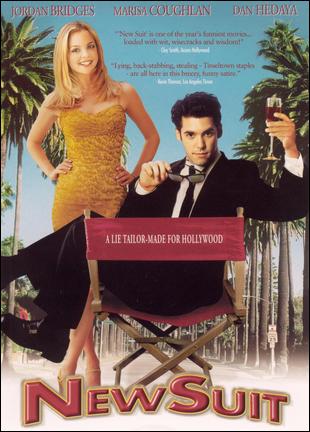
New Suit
** (Worth seeing)
Directed by Francois Velle
Written by Craig Sherman
With Jordan Bridges, Marisa Coughlan, Heather Donahue, Dan Hedaya, Mark Setlock, Benito Martinez, Charles Rocket, and Paul McCrane.
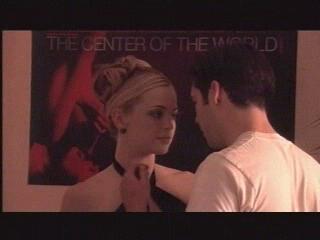
As the opening narration makes clear, New Suit — a satirical comedy about Hollywood suits — is loosely based on “The Emperor’s New Clothes.” Kevin Taylor, a 24-year-old script editor and frustrated screenwriter, is already jaded after 18 months working in the office of has-been producer Muster Hansau. Taylor (Jordan Bridges) gets especially irritated one day after hearing some of his hotshot coworkers spout bullshit at the studio commissary. He gets up from the table and buys a strawberry ice cream cone from a guy named Jordan, then returns and starts talking about an imaginary hot new script called “New Suit” by an imaginary writer named Jordan Strawberry that he says his bosses are excitedly pursuing.
His tablemates simultaneously claim they’ve already heard about the script and pump him for more information. Before long the whole town is talking about this promising property — especially after Kevin’s former girlfriend Marianne, a rising agent, overhears him saying that Strawberry is “unrepresented.” She promptly claims to be representing him, which starts a bidding war between two studios. Read more
From the Chicago Reader (April 11, 2003). — J.R.
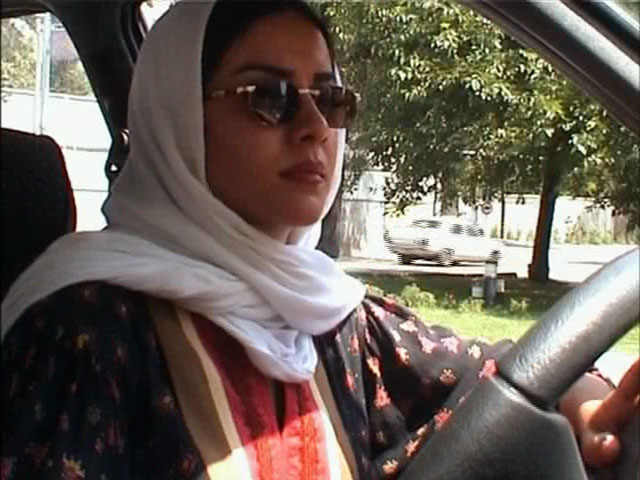
10
*** (A must-see)
Directed by Abbas Kiarostami
With Mania Akbari, Amin Maher, Roya Arabshahi, Katayoun Taleidzadeh, Mandana Sharbaf, Amene Moradi, and Kamran Adl.
In my mind, there isn’t as much of a distinction between documentary and fiction as there is between a good movie and a bad one. — Abbas Kiarostami in an interview

One way to identify the world’s greatest filmmakers is to determine which ones have found it necessary to reinvent the cinema from the ground up. The names that quickly come to my mind are Antonioni, Bresson, Chaplin, Dreyer, Eisenstein, Godard, Griffith, Kubrick, Mizoguchi, Renoir, Tati, and Welles — a far from exhaustive list of mercurial artists who rethought the nature of the medium not once but repeatedly, most often to their commercial disadvantage.
Not all of these figures qualify as “difficult,” though even such crowd pleasers as Chaplin, Griffith, and Kubrick were called that at some points during their careers. Whether people wound up seeing them as old-fashioned or unfashionable, these artists refused to turn themselves into commodities, alienating even their most passionate fans by confounding expectations and changing the rules of the game, and at times scaring off potential investors. Read more
From the April 25, 2003 Chicago Reader. — J.R.
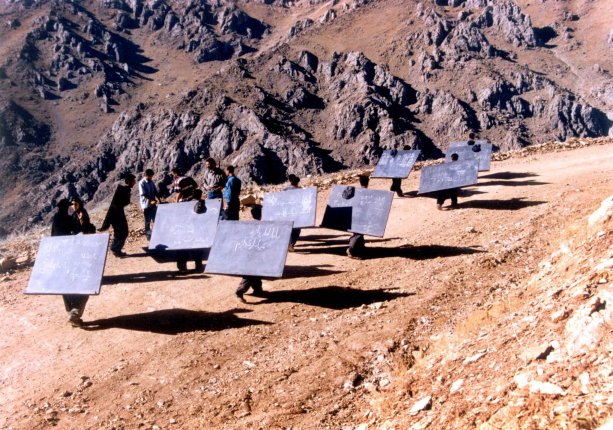
Blackboards
*** (A must-see)
Directed by Samira Makhmalbaf
Written by Mohsen and Samira Makhmalbaf
With Bahman Ghobadi, Said Mohamadi, and Behnaz Jafari.
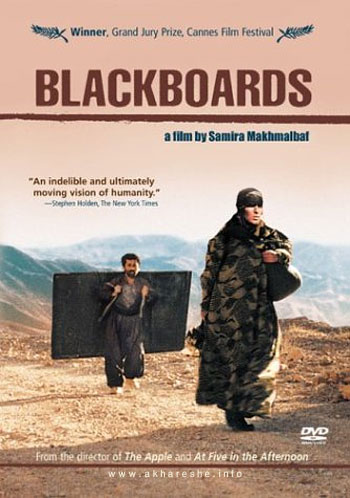
I don’t know why it’s taken three years for Samira Makhmalbaf’s second feature to reach Chicago. It was finished in 1999 and won the jury prize at Cannes the following year. The Iranian director was only 17 when she finished her remarkable first feature, The Apple, which also screened in competition at Cannes and made her one of the youngest directors ever to gain an international reputation. Since then, she has made the 11-minute “God, Construction and Destruction,” about the responses of Afghan refugee children in Iran to the attacks on the World Trade Center, which is part of the 2002 international episodic feature 11/09/01 (still unscreened in the U.S.). She has also made the feature At Five in the Afternoon, about a young woman in post-Taliban Afghanistan, which is expected to premiere at Cannes in May.
All of her features to date have been produced, edited, and written or cowritten by her father, Mohsen Makhmalbaf. But the three films of hers that I’ve seen are significantly different from his in that they deal with communities more than individuals, and I happen to like The Apple more in some respects than any film directed by him. Read more






